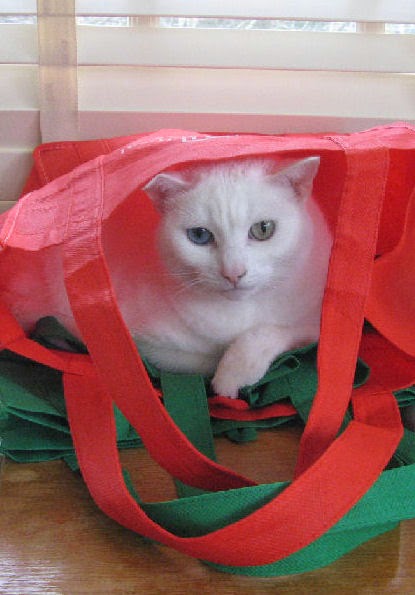She was a flea-bitten mess when we got her from a farm in northern Orange County, NC, in 2003. Our first day with her was spent mostly at the vet. She was seven weeks old, barely weaned, and weighed all of 2 pounds. Two of the other cats in her litter--both white--were deaf. Her odd eyes--one blue, one gold--saved her hearing; in this photo she is about five:
For years when I left the house, I sang "Bye, girl. Talking 'bout bye-i-i girl" (my apologies to The Temptations). Then upon returning home, I sang walking up the ramp to the back porch, "Hi, girl. Talking 'bout hi-i-i girl." Opened the door, and there she was. Whether she knew the difference in the "Bye" and the "Hi," singing to her gave me enough pleasure to justify it.
We killed her yesterday. Had her put down. Put her to sleep. Euthanized her. Committed pet-icide. Watched while a kind veterinarian gave her a lethal dose via a needle inserted into the only vein she could find. Saw her eyes glaze over as I sang her away, cheek to cheek, "Bye, girl..." This time it was she who was leaving.
She had a lovely bed.
But any open bag was an invitation she accepted over and over.
I used to teach a writing class on Tuesday evenings; one of my students had allergies. About half an hour before class, I'd start trying to get Stilla into the laundry room (where her litter box and food awaited her). She'd run wherever I wasn't. From the kitchen into the hallway. Then as I got to the hallway, back to the kitchen, then the living room. I'm chasing her all the while, calling, "Stilla, damnation, it's Tuesday." Eventually I got Jean-Michel to help me catch her, then deposit her in her room. One Tuesday evening we're about to go through this ritual, frustrating for all involved, and as soon as I say, "Stilla, it's Tuesday," she sedately turns and walks into the laundry room. From then on, no matter what day of the week it was, if we needed her to be shut off in the laundry room I'd call out, "Stilla, it's Tuesday!" then watch her run into the laundry room. No chasing. In her own inimitable way, she won.
In the fall of 2014 we were gone for five weeks. Our cat sitter visited Stilla regularly, kept her litter box clean, played with her, etc., so she wasn't abandoned. But upon our return, she stayed by my side for several days. This photo shows her at my elbow as I worked, and her naps on my desk gave me a good excuse not to deal with the stacks of mail that had accumulated in my absence.
And for about a week after our homecoming she slept with me at night (unprecedented)--in this photo I'm reading while scratching her belly; she fell asleep and stayed there until my hand went to sleep, too, and I had to disturb her.
For several years we had a portable humidifier in our living room, a square water tank on wheels. After some trial and error, Stilla discovered that if she ran and jumped onto it, she could ride it for several feet across the floor. Jean-Michel didn't believe me when I first told him about this game, but one morning at breakfast he got to witness our cat turning our humidifier into a carny ride. (Never got a photo of it...)
Her most steadfast post was in the window of our laundry room, where we'd installed a board above the dryer for her to sleep in the sun. I wish I had a better photo, but am glad I at least have this one.
The thing I admired most about our odd and odd-eyed Stilla was that everything she ever did was on her own terms.
'Bye, girl. Talking 'bout bye-i-i girl.








